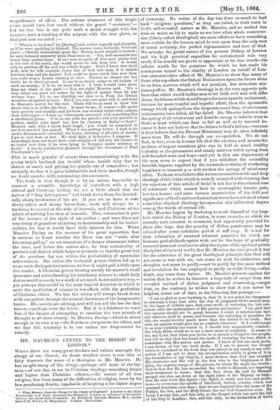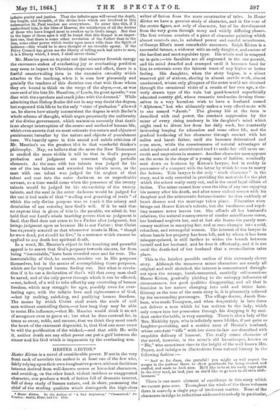MR. MAURICE'S LETTER TO THE BISHOP OF LONDON.*
WHILE there are many great thinkers and writers amongst the clergy of our Church, we doubt whether there is one who so fully deserves the name of a theologian as Mr. Maurice. He has taught many of the clergy—perhaps still more of the lay- men,—of our day, to see in Christian theology something deeper and higher than Christian religion,—the source of all true religion, free from many of the difficulties of religion, beset by far less perplexing doubts, capabable of inspiring a far higher degree
* What Masao Hate the Clergy for the People of England? A Letter to the Right Honourable sod Right Reverend the Bishop of London in reference to the contro. Vera, on the future state of sinners. By Frederick Denham Maurice, MA., Incum- bent of Bt. Peter's, St. Marylebone. London : Mao milieu.
of certainty. No writer of the day has done so much to lead back" religious questions," as they are called, to their roots in
God's self-revealed nature as Mr. Maurice, and no method has done so much as his to make us see how often whole controver- sies (falsely called theological) are mere efforts to have something more certain for the human mind to rest upon than the only root of moral certainty, the perfect righteousness and love of God. We mistake the genial nature of the present Bishop of London and his high practical capacities for ecclesiastical rule very much, if he should not prove to appreciate at its true worth—its infinite worth for the purposes for which he has made his courageous appeal to the charity of London on behalf of Lon- don outcasts—this effort of Mr. Maurice's to show that many of those who repudiate the Oxford Declaration upon the future state
do so from motives which will not paralyze, but stimulate mis- sionaryeffort. Mr. Maurice's theology is at the very opposite pole from that which would incline men to let both evil and well alike alone, forit is one which should inspire far more equable and earnest, because far more trustful and hopeful effort, than the spasmodic energy which springs from the desperate creed that, where human missionaries have failed, all has failed. Mr. Maurice believes that the spring of all wholesome and durable energy is infinite trust in
God—a trust which can bear to fail as well as to succeed be- cause it does not believe that its failure is God's failure,—because it does believe that the Eternal Missionary may do alone infinitely more than He will do through our co-operation. We do not find, in fact, even in human life that the exciting and spasmodic
motives of urgent occasions give rise to half as much healthy industry as the permanent and steady motives which spring from well-founded trust and hope—and yet in this one department of life men seem to expect that if you withdraw the unhealthy feverish impulse supplied by the tremendous stakes of everlasting happiness or torment you will weaken the springs of missionary effort. To those who believe this we recommend the noble and deep theology of this letter which is entirely occupied with showing that the rejection of this article of belief is not due to the relaxed tone of sentiment which cannot bear to contemplate human pain, but to a keener and more intense appreciation of the drift and significance of God's self-revelation than those have attained whose somewhat slipshod theology incorporates this inferential dogma among the words of eternal life.
Mr. Maurice begins by declining to avail himself of the loop- hole which the Bishop of London, in some remarks on which we
recently took occasion to comment, had apparently provided for those who hope that the severity of divine punishment may be relaxed after some indefinite period of suffering. It is not for that relaxation of external criminal penalties for which our humane gaol-philanthropists wish, not for the hope of gradually
restored personal comforts to allay the rigour of the spiritual prison discipline of the next world, that Mr. Maurice has everpleaded, but for the admission of the great theological principle that God will
not cease to war with sin, not cease to seek its extinction, and therefore not cease to purify,—nor to purify by the same method and revelation he has employed to purify us while living,—after death, any more than before. Mr. Maurice protests against the notion that he wishes to discover a loop-hole of escape from the
revealed method of divine judgment and chastening,—urges that, on the contrary, he wishes to show that it can never be helpless, never out of date, in the following fine passage :-
"I am as glad as your lordship is, that 'it is not penal for clergymen to entertain a hope that after the day of judgment God's mercy may, in the lapse of infinite ages, find some mode of restoring the lost con- sistent with the maintenance of His purity and justice.' I am glad that this opinion should not be penal, because I count it mischievous that any opinions shall be penal, and because the enforcing of penalties for this one would involve much more than the denial of its truth. But such an opinion would give me no comfort whatever. If I could accept it, as your lordship has stated it, I should lose unspeakable comfort; the whole Bible would be to me a mere mass of confusion. It seems to me, my Lord, that when you invite us to preach a Crospel to the people, you tell us that God has found the mode of restoring the lost, vfhich is consistent with His purity and justice. I knew of but one such mode. I can dream of but one such mode. If I am to preach the Gospel which is contained in the book that was placed in my hands at my ordi- nation, if I am not to deny the interpretation which is given of it in the formularies of our Church, I mast declare that God has revealed His character and His will in the Son who is the brightness of His glory, the express image of His person, by whom He made the worlds ; that in that Son He has reconciled the world to Himself, not imputing their trespasses to them ; that this Son, when He had by Himself purged our sins, sat down at the right hand of the Majesty on high ; that He sent forth His Spirit—the Spirit of truth and love and meek- ness—to overcome the spirits of falsehood, hatred, cruelty, which had usurped dominion over men ; that we are baptized into the name of the Father, the Son, and the Holy Ghost, the one God blessed for ever. My Lord, I accept this and this only, as the Gospel which can save the lost of the City of London; this, and this only, as the declaration of God's infinite purity and justice. That the infinite ages will reveal the depth, the length, and, breadth, of the divine love which are involved in this redemption St. Paul teaches me everywhere. To enter into this, if I understand him, is the bliss of Heaven, the satisfaction of all the desires of those who have longed most to awaken up in God's image. But that in the lapse of those ages it will be found that this Gospel is an imper- fect one, that there is some other revelation of the Father than in the Son, some other power which works upon men's wills than the Spirit of holiness—this would be to me a thought of unutterable agony. If the Privy Council has given me the liberty of telling such bad news to men, it is a liberty which, I trust, I shall never claim."
Mr. Maurice goes on to point out that whatever feverish energy the enormous stakes of everlasting joy or everlasting perdition may seem to impart to Christian eloquence and effort, there is a fearful countervailing item in the excessive unreality which attaches to the teaching, when it is seen how pleasantly and genially the teachers of this doctrine can chat with those whom they are bound to think on the verge of the abyss,—or, as was once said of the late Dr. Hamilton, of Leeds, its great apostle," can dine with the reprobate and crack jokes with the damned." While admitting that Bishop Butler did not in any way doubt the dogma, but supposed this life to be the only "state of probation" allowed us, he shows how utterly inconsistent the dogma is with Butler's whole scheme of thought, which urges perpetually the uniformity of the divine government, which maintains earnestly that death is no abrupt interruption of the course and method of human life, which even asserts that we must estimate the nature and objects of punishment hereafter by the nature and objects of punishment here. We heartily agree in this sound and subtle criticism of Mr. Maurice's on the greatest blot in that wonderful thinker's philosophy. Nay, we believe that the more the New Testament is studied the more visible it will be that in God's purpose probation and judgment are constant though periodic elements. As the man with ten talents was judged for his use of the ten talents and awarded ten talents more, as the man with one talent was judged for his neglect of that talent anti cast into the outer darkness as an unprofitable servant, so a time would come when the possessor of the twenty talents would be judged for his stewardship of the twenty talents, and the soul in the outer darkness would be judged for the use it had made of that " wailing and gnashing of teeth" of which the only divine purpose was to teach it the misery and desolation of not entering into God's will. If it be said that no express hint is given of this in the parable, we admit it, but hold that our Lord's whole teaching proves that no judgment is final, that God does not cease to be a Father after judgment, but brings judgment upon us because He is our Father ; that Christ
has expressly assured us that whosoever trusts in Him, "though he were dead, yet should he live," in a sentence which cannot be applied to any death but spiritual death.
In a word, Mr. Maurice's object in this touching and powerful appeal is to assert that God's purposes towards sinners, far from being "inscrutable," have been revealed once and for ever. The inscrutability of God, he asserts, consists not in His purposes themselves, but in the means of accomplishing those purposes, which are far beyond human finding out. But what is revela- tion if it be not a declaration of God's will that every man shall be saved, and of the only power through which it can be effected, —not, indeed, of a will to take effect by any overruling of human freedom, which may struggle for ages, possibly even for ever- lasting ages, with the infinite love and righteousness of God, —but by melting, subduing, and purifying human freedom. The means by which Christ shall reach the souls of evil men without controlling them,—or how long they may be able to resist His influence,—that Mr. Maurice would think it an act of arrogance even to guess at ; but what he does contend for, in tones so sweet, noble, and earnest, that we think they must reach the heart of the extremest dogmatist, is, that God can never cease to will the purification of the wicked,—and that while He wills it, neither death nor any other power can put a gulf between the sinner nnd his God which is impassable by the everlasting arm.































 Previous page
Previous page